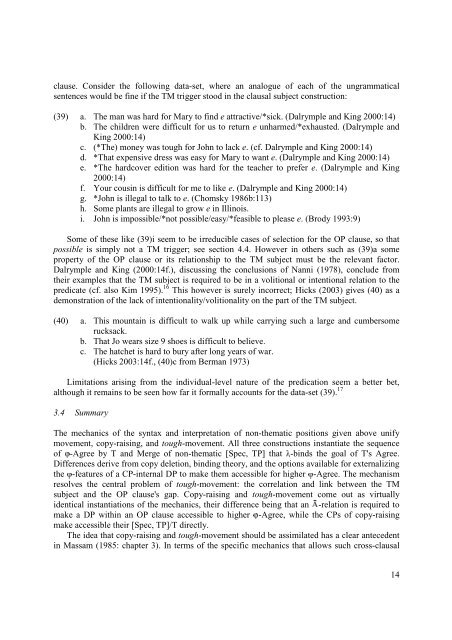1 On tough-movement* Milan Rezac, University ... - Multimania.co.uk
1 On tough-movement* Milan Rezac, University ... - Multimania.co.uk
1 On tough-movement* Milan Rezac, University ... - Multimania.co.uk
Create successful ePaper yourself
Turn your PDF publications into a flip-book with our unique Google optimized e-Paper software.
clause. Consider the following data-set, where an analogue of each of the ungrammatical<br />
sentences would be fine if the TM trigger stood in the clausal subject <strong>co</strong>nstruction:<br />
(39) a. The man was hard for Mary to find e attractive/*sick. (Dalrymple and King 2000:14)<br />
b. The children were difficult for us to return e unharmed/*exhausted. (Dalrymple and<br />
King 2000:14)<br />
c. (*The) money was <strong>tough</strong> for John to lack e. (cf. Dalrymple and King 2000:14)<br />
d. *That expensive dress was easy for Mary to want e. (Dalrymple and King 2000:14)<br />
e. *The hard<strong>co</strong>ver edition was hard for the teacher to prefer e. (Dalrymple and King<br />
2000:14)<br />
f. Your <strong>co</strong>usin is difficult for me to like e. (Dalrymple and King 2000:14)<br />
g. *John is illegal to talk to e. (Chomsky 1986b:113)<br />
h. Some plants are illegal to grow e in Illinois.<br />
i. John is impossible/*not possible/easy/*feasible to please e. (Brody 1993:9)<br />
Some of these like (39)i seem to be irreducible cases of selection for the OP clause, so that<br />
possible is simply not a TM trigger; see section 4.4. However in others such as (39)a some<br />
property of the OP clause or its relationship to the TM subject must be the relevant factor.<br />
Dalrymple and King (2000:14f.), discussing the <strong>co</strong>nclusions of Nanni (1978), <strong>co</strong>nclude from<br />
their examples that the TM subject is required to be in a volitional or intentional relation to the<br />
predicate (cf. also Kim 1995). 16 This however is surely in<strong>co</strong>rrect; Hicks (2003) gives (40) as a<br />
demonstration of the lack of intentionality/volitionality on the part of the TM subject.<br />
(40) a. This mountain is difficult to walk up while carrying such a large and cumbersome<br />
rucksack.<br />
b. That Jo wears size 9 shoes is difficult to believe.<br />
c. The hatchet is hard to bury after long years of war.<br />
(Hicks 2003:14f., (40)c from Berman 1973)<br />
Limitations arising from the individual-level nature of the predication seem a better bet,<br />
although it remains to be seen how far it formally ac<strong>co</strong>unts for the data-set (39). 17<br />
3.4 Summary<br />
The mechanics of the syntax and interpretation of non-thematic positions given above unify<br />
movement, <strong>co</strong>py-raising, and <strong>tough</strong>-movement. All three <strong>co</strong>nstructions instantiate the sequence<br />
of φ-Agree by T and Merge of non-thematic [Spec, TP] that λ-binds the goal of T's Agree.<br />
Differences derive from <strong>co</strong>py deletion, binding theory, and the options available for externalizing<br />
the φ-features of a CP-internal DP to make them accessible for higher φ-Agree. The mechanism<br />
resolves the central problem of <strong>tough</strong>-movement: the <strong>co</strong>rrelation and link between the TM<br />
subject and the OP clause's gap. Copy-raising and <strong>tough</strong>-movement <strong>co</strong>me out as virtually<br />
identical instantiations of the mechanics, their difference being that an Ā-relation is required to<br />
make a DP within an OP clause accessible to higher φ-Agree, while the CPs of <strong>co</strong>py-raising<br />
make accessible their [Spec, TP]/T directly.<br />
The idea that <strong>co</strong>py-raising and <strong>tough</strong>-movement should be assimilated has a clear antecedent<br />
in Massam (1985: chapter 3). In terms of the specific mechanics that allows such cross-clausal<br />
14
















